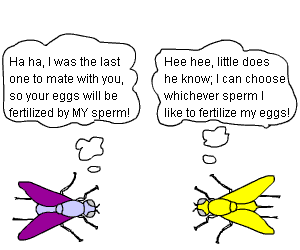If a female mates with two different males, which male's sperm will fertilize the eggs? This question has turned out to be a fascinating field of research, one that has yielded an abundance of data, theory, and information. Research in this area usually goes under the heading of "sperm competition."
To give a brief overview of findings in this area, here are some documented
examples of male strategies:
- the sperm of some males may swim faster than those of other males, and thus will win the race to fertilize the eggs.
- in some cases, the rule is "last in, first out" or the sperm from the most recent male is the sperm that will be used to fertilize the eggs.
- if a male transfers a large volume of sperm, it may "push out" or displace the sperm that was there first.
- some males have an apparatus on their genitalia that actively "scoops out" the previous sperm.
- the male may prevent the female from mating again by guarding her, or by plugging up her genital opening with a "sperm plug."
The female can play an active role in this process, and not just by choosing whom to mate with. In species whose females mate with more than one male, and who store sperm internally, "cryptic" (hidden from view) female choice can occur:
- the female may manipulate the sperm or spermatophores in her genital tract, and thus be able to "choose" which sperm will fertilize her eggs.
- the female may preferentially choose the sperm of the male that gives her the most valuable nuptial gift.
- females may choose to invest different
amounts of resources in the offspring of different males.

